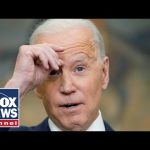Former President Donald Trump has once again taken center stage in the ongoing debate over Iran’s nuclear ambitions, delivering a resolute message that underscores his commitment to preventing Tehran from acquiring nuclear weapons. As negotiations between the United States and Iran are set to begin in Oman this weekend, Trump’s firm stance has sent ripples through the global diplomatic community, signaling a potential shift in America’s approach to the Iranian regime.
Trump’s declaration that Iran “cannot have nuclear weapons” is more than rhetoric—it is a line drawn in the sand. His warnings of military action if Iran fails to comply with demands for a new nuclear deal reflect a no-nonsense approach to a regime that has consistently defied international agreements. This is not merely about diplomacy; it is about safeguarding America’s allies and ensuring stability in a region long plagued by conflict. Trump’s willingness to consider military intervention highlights his belief that peace cannot be achieved through appeasement but requires strength and resolve.
The former president has also emphasized the distinction between Iran’s leadership and its people, calling the Iranian population “incredible” and “very smart.” This nuanced perspective acknowledges the potential for prosperity among ordinary Iranians while condemning the oppressive regime that has stifled their progress. Trump’s comments suggest that he views regime change or significant reform as essential to unlocking Iran’s potential—a position that aligns with conservative principles of promoting freedom and individual opportunity.
Critics of past U.S. administrations have often pointed to the failure of diplomatic agreements, such as the 2015 Joint Comprehensive Plan of Action (JCPOA), which Trump famously withdrew from in 2018. By reinstating sanctions and adopting a “maximum pressure” strategy, Trump sought to curb Iran’s nuclear activities and diminish its ability to fund proxy groups like Hezbollah. His current stance reaffirms his belief that any deal must go beyond temporary restrictions and ensure the complete dismantling of Iran’s nuclear program—a goal shared by Israel, whose Prime Minister Benjamin Netanyahu has echoed similar sentiments.
As these high-stakes talks unfold, conservatives are watching closely, wary of any compromise that might embolden Iran or weaken America’s position. Trump’s approach serves as a reminder that national security cannot be negotiated away for short-term gains. With reports indicating that Iran is closer than ever to developing weapons-grade uranium, time is of the essence. The choice before America is clear: either enforce stringent measures to prevent a nuclear-armed Iran or face the consequences of unchecked aggression.
Trump’s leadership on this issue underscores his commitment to putting America first while maintaining global stability. His refusal to back down from tough decisions reflects a broader conservative philosophy that values strength, accountability, and unwavering principles in foreign policy. As negotiations begin, the world waits to see whether this bold strategy will yield results or whether military action will become an unavoidable reality.




